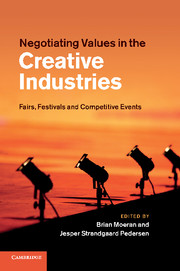Book contents
- Frontmatter
- Contents
- Figures
- Tables
- Contributors
- Acknowledgements
- Introduction
- 1 A Salon’s life
- 2 Art fairs
- 3 Biennalization and its discontents
- 4 Staging auctions
- 5 The book fair as a tournament of values
- 6 Inventing universal television
- 7 Transforming film product identities
- 8 Event institutionalization and maintenance
- 9 Tradition and transformation at the Fan Fair festival
- 10 Between art and commerce
- 11 Configuring sustainability at fashion week
- 12 An inconvenient truce
- 13 The retrospective use of tournament rituals in field configuration
- Afterword Converting values into other values
- Author index
- Subject index
- References
9 - Tradition and transformation at the Fan Fair festival
Published online by Cambridge University Press: 25 October 2011
- Frontmatter
- Contents
- Figures
- Tables
- Contributors
- Acknowledgements
- Introduction
- 1 A Salon’s life
- 2 Art fairs
- 3 Biennalization and its discontents
- 4 Staging auctions
- 5 The book fair as a tournament of values
- 6 Inventing universal television
- 7 Transforming film product identities
- 8 Event institutionalization and maintenance
- 9 Tradition and transformation at the Fan Fair festival
- 10 Between art and commerce
- 11 Configuring sustainability at fashion week
- 12 An inconvenient truce
- 13 The retrospective use of tournament rituals in field configuration
- Afterword Converting values into other values
- Author index
- Subject index
- References
Summary
Fairs and festivals provide a context for the reenactment of institutional arrangements and the negotiation of values within institutional and geographic fields. These arrangements include the spatial and temporal ordering of events, financial management, the provision of lodging, food and entertainment and safety and crowd control, among others. The values participants negotiate are plural and cultural and include material/technical, situational, appreciative and functional aspects of the event. The value orientations of participants rationalize, organize and motivate institutional arrangements, and, in turn, these arrangements reinforce the symbolic meanings that position participants in a relational system (Glynn, 2008: 1,118).
At some festivals and fairs, new relational and symbolic arrangements emerge from the confluence of participants, and therefore have significance for the institutional fields in which they are located. These events can be viewed as tournament rituals, or ‘complex periodic events’ that ‘occur in special times and places’ and whose ‘forms and outcomes are always consequential for the more mundane realities of power and value in ordinary life’ (Appadurai, 1986: 21). According to Durkheim (1965), rituals express and reinforce the cognitive categories that unite communities; tournament rituals serve this purpose within organizational fields (Anand and Jones, 2008: 1,038; see also Chapter 13 by Anand in this volume). Tournament rituals can be found in a variety of contexts, including high art productions (Barbato and Mio, 2007; Evans, 2007; Tang, 2007), sports (Glynn, 2008) and industry events (Havens, 2003; Anand and Watson, 2004; Harrington and Bielby, 2005). Indeed, scholars increasingly address tournaments of value as ‘field-configuring events’ (FCEs) (Lampel and Meyer, 2008) since they often lead to changing conditions in organizational fields (Anand and Jones, 2008).
- Type
- Chapter
- Information
- Negotiating Values in the Creative IndustriesFairs, Festivals and Competitive Events, pp. 224 - 248Publisher: Cambridge University PressPrint publication year: 2011
References
- 4
- Cited by



